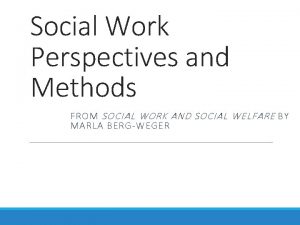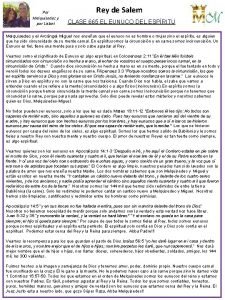Research in Social Work Practice Salem State University































- Slides: 31

Research in Social Work Practice Salem State University Jeff Driskell, MSW, Ph. D

Today’s Class Check-in Announcements Lecture Qualitative Research

Qualitative Approach

What Do We Mean- Qualitative Research?

Approach § Qualitative analysis is the non-numeric examination and interpretation of observations. – …. . Purpose is to discover underlying meanings and patterns, such as changes over time or possible links between concepts. Involves a continuing interplay between data collection and theory.

Why Use Qualitative Methods? Exploring a new topic Addressing sensitive topics Capturing the “lived” experience of your sample Process evaluation Formative research (focus groups) Used to supplement quantitative study findings Give VOICE to marginalized and oppressed populations. Develop theory (inductive) and generate hypotheses

Characteristics of Quantitative and Qualitative Methods (Dudley, 2005; Neuman, 2003) Quantitative Qualitative Concepts- form of variables Deductive reasoning Support an existing explanation Replication assumed Linear research process Structured research Forced-response questions Data in number form Concepts- form of themes/words Inductive reasoning Discover a new explanation Replication is rare Circular research process Semi-or unstructured interviews Open-ended questions Data in word form, observations Word analysis Statistical analysis

What do they have in common? Choosing a general research topic Turing that topic into a research question Designing the research study Collecting the data Analyzing and interpreting the data Writing the report

Selecting A Research Design: How Do I Know Which Design to Use? ? ? Your research design will be driven by your study purpose and research question(s).

Required Skills and Traits. Researcher as the Instrument Ability to think conceptually Collaboration Multitask- memos, coding, re-coding Interpersonal qualities (observing vs. interacting) Patience- large amounts of data to sort through

Qualitative Approaches (Padgett, 2008) Grounded Theory Naturalism/Ethnography Phenomenological (HIV disclosure article example) Case Study Life course/narrative

Qualitative Research: Specific Methods

Methods Sampling Data collection strategies Establishing rigor/trustworthiness Data analysis

Qualitative Sampling Not concerned with generalizability of findings but more so the depth and quality of the data. Non-probability approach (not randomized) Typically a purposive sampling Sample size varies (attempt saturation) Your sample may vary during the life of your study

Qualitative Sampling Non-Probability Sampling Convenience Quota Purposive Snowball

Other Sampling Types/Techniques (Patton, 2002) Extreme or deviant case sampling- “outer edges” of a phenomena Intensity sampling Maximum variation sampling Homogeneous sampling- opposite maximum variation. More heterogeneous. Typical case sampling- recruits average members of a population

Data Collection Strategies § Informal conversational interview § Semi-structured interview (show example) § Structured interview © 2011, Brooks/Cole Publishing, A Division of Cengage Learning, Inc.

Individual vs Focus Group Based on the readings: What are pros/cons of focus group as a method of collecting data?

Qualitative Interviewing Conversations are geared towards the participant and not you (avoid too much dialogue) The participant should be doing majority of the talking Interviews are usually flexible May have more than one interview per participant

Method of Analysis Electronically Excel NVIVO Manually Word documents printed out Long hand- file method Use of colored markrs

Exercise. Utilizing the Squires, C. R. , Kohn-Wood, L. P. , Chavous, T. & Carter, P. L. (2006) article. What is the research question (s) that is being asked? If not explicitly stated, what do you infer the question(s) to be? Does the questi 0 n(s) match the research design? Describe the data collection approach

Qualitative in Action http: //www. ted. com/talks/brene_brown_listening_to _shame https: //www. youtube. com/watch? v=RSj. HQRr. NUi. E

Trustworthiness Challenges

Standards for Establishing Rigor Strategies to minimize threats to trustworthiness

Exercise Utilizing Driskell et al. (2008), answer the following questions. Identify the study purpose Identify the research question(s) Sampling approach How did the researchers establish rigor?

Data Analysis

Coding/Thematic Development Open Coding Interpretation of Results Inter-rater reliability Compare…Confirm initial codes/definitions Codebook Development

Strategies- A Framework for Coding (Bohm, 2004) 1. 2. 3. 4. 5. 6. 7. 8. Process (phases, transitions, sequences) Degree of integrity (following their value system) Strategies (tactics, techniques) Interactions Identity (self-concept, self-reflection) Turning points (critical junctures) Cultural and social norms Consensus (conformity vs. conflict)

Exercise- Putting it all together Select two qualitative articles of your choice… What is the research question(s) What is the sampling approach? Did the authors use a structured or semi-structured interview approach? How was the data recorded? Outline the analytic steps/procedures What strategies for rigor were implemented?

Activity Develop two research questions that can be answered qualitatively based on your assignment #1.

Journals that Feature Qualitative Studies (Padgett, 2008) Qualitative Social Work Qualitative Research The Qualitative Report International Journal of Qualitative Methods Journal of Contemporary Ethnography
 Salem state msw
Salem state msw Kathy lemon sjsu
Kathy lemon sjsu Salem state msw
Salem state msw Salem state career services
Salem state career services Wsfcs social studies
Wsfcs social studies Novosibirsk national research state university
Novosibirsk national research state university Generalist perspective definition
Generalist perspective definition What is social case work
What is social case work Theories for direct social work practice
Theories for direct social work practice York model of reflection
York model of reflection Defining policy practice in social work
Defining policy practice in social work Berg-weger practice of generalist social work download
Berg-weger practice of generalist social work download Western michigan university msw
Western michigan university msw Boston university social work
Boston university social work Social work boundaries quiz
Social work boundaries quiz University of texas arlington social work
University of texas arlington social work Boston university school of social work
Boston university school of social work University of memphis msw
University of memphis msw Griffith university social work
Griffith university social work Models of social group work
Models of social group work Social welfare vs social work
Social welfare vs social work Principle of dramatization
Principle of dramatization Relationship of social work with other social sciences
Relationship of social work with other social sciences Global agenda for social work and social development
Global agenda for social work and social development Social change in social work
Social change in social work Social thinking social influence social relations
Social thinking social influence social relations Social thinking social influence social relations
Social thinking social influence social relations Discovery education salem witch trials
Discovery education salem witch trials What sort of evidence was used to arrest accused witches
What sort of evidence was used to arrest accused witches Contributors
Contributors National geographic salem witch trials
National geographic salem witch trials Melquisedec lisbet
Melquisedec lisbet





















































